Research has shown that democracy is the best and one of the most practiced systems of government in the world. This is so because of its numerous advantages and also due to the fact that most developed countries practices it. Nonetheless, it must me noted that without the pillars of democracy, then there is no true democracy.
The pillars of democracy are the essentials of every democratic government and where those pillars are absent, the government may not be able to function properly. In light of the above, i am going to share with you the 7 pillars of democracy in this article.
But before doing that, lets quickly see what democracy means and why democracy is deemed to be the best systems of government in the world. Here we go!
Also read: Criticisms on the theory of democracy
Meaning of Democracy
Democracy is a system of government in which the people rules either directly (direct democracy) or through representatives (indirect democracy) periodically elected by them.
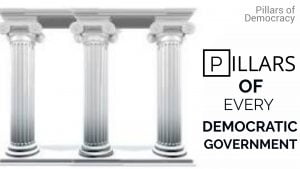
Abraham Lincoln (1809-1865), one of the major proponent of democracy, defined it as “Government of the people, by the people and for the people“. Accordingly, Wikipedia defines it as a system where citizens are allowed to exercise their power by voting.
All the above definitions clearly explains what democracy is about. The key point to note here is that democracy is a rule by the people. That is, a government where every member of the country participates in political decision making.
For further explanation of the meaning of democracy, i recommend that you watch the video below. Trust me, you will enjoy it.
Types of democracy
Basically, there are two major types of democracy namely; Direct Democracy and Indirect Democracy or representative democracy.
Direct democracy is a type of democracy where the people come directly to participate in the political decision making of the nation. Here, the opinion of each member of the nation is counted and taken into consideration when political decisions are made.
On the other hand, Indirect or representative democracy is a type of democracy where the people elect their representatives into power to make political decisions on their behalf. In this type of democracy, election is a necessity because it is that way that the interest of the people can still be ensured.
Reasons for democracy
Below are some of the reasons why most countries practice democracy:

1. It frowns at dictatorship: Since democracy is a government by the people, there is hardly room for dictatorship and that is why many people love the system. Through this way, democracy is able to capture the dreams and aspirations of every member of the society and not the selfish desire of a particular dictator.
2. Everyone participates in the system: Another reason why democracy is deemed to be the best system of government is because, unlike other systems of government, it encourages popular participation in politics a lot. This is done either directly or through representatives elected by the people.
3. Accountability and transparency in government: Throughout history, there has never been any government that supports accountability and transparency as a democratic one. Even till today, the most transparent governments in the world are usually democratic in nature.
4. Peace and Equality: Democracy tries to carry everybody along and that is why the system is loved by many. Even when there is majority and minority in political decision making processes, democracy still provides and makes space for the minority.
Below is an infographics showing the 7 essential pillars of democracy and a brief explanation of all of them.
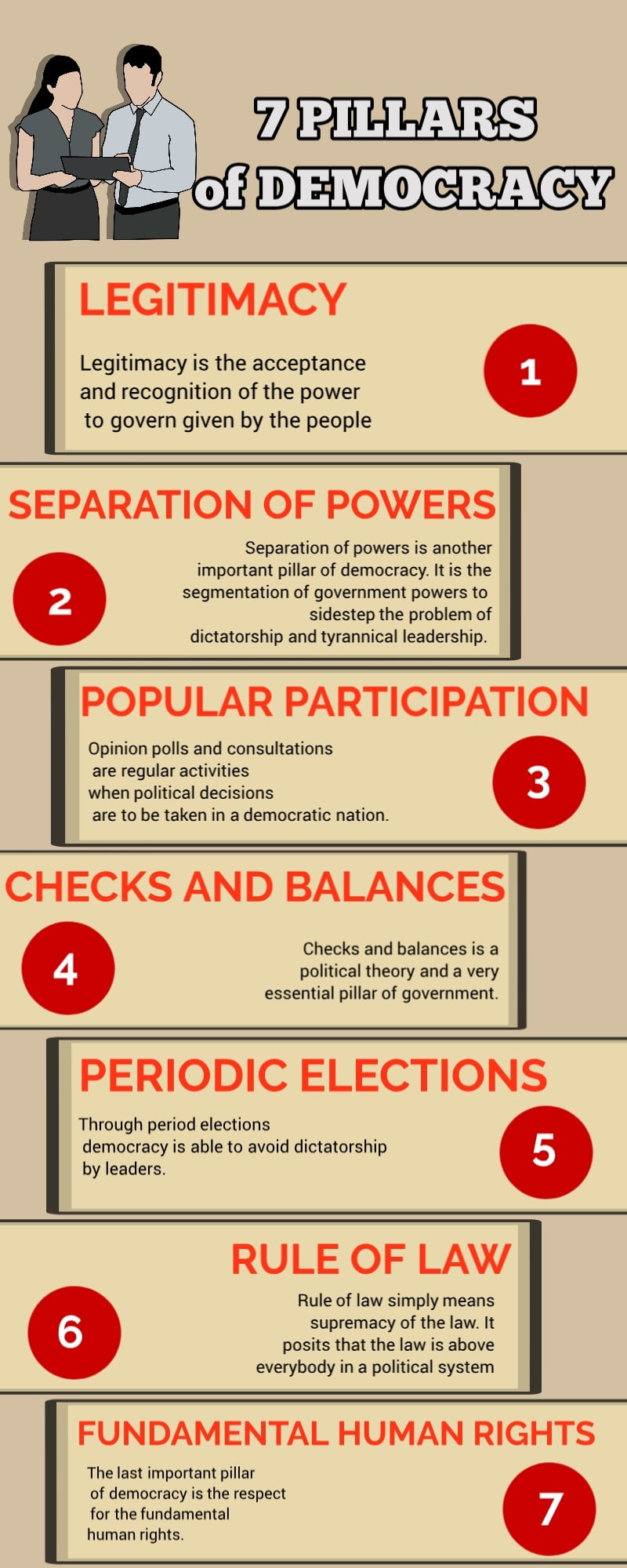
Major Pillars of Democracy
Below are the 7 major pillars of democracy:
1. Legitimacy
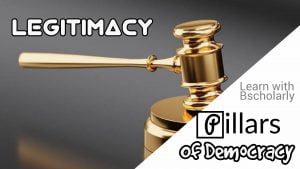
Legitimacy simply means the acceptance and recognition of the power to govern given to the leaders. It is one of the major pillars of democracy because the absence of legitimacy means that the people did not legally assign political powers to their leaders to govern them.
Legitimacy cannot be achieved when there is no periodical elections, conducted to enable the people appoint their leaders. It should also be noted that the same way the people can Legitimately appoint their leaders, they can also legitimately remove whoever they want from power through impeachment or recall.
2. Separation of powers
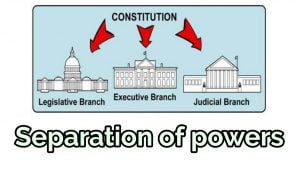
Separation of powers is another important pillar of democracy. It is the segmentation of government powers to sidestep the problem of dictatorship and tyrannical leadership. Usually, the segment of powers is between the legislature, executive and judicial pillars of the government.
So, instead of bestowing all political powers on one person of group of people or allowing just one arm of government to perform all government functions, powers and functions will be shared between the arms.
In most cases, the legislature will perform the law making function, the judiciary will perform the interpretation function and the executive will execute the law.
Also read: Cheapest universities to attend in Canada
3. Popular participation

Democracy is unlike a monarchy where only persons from the lineage of the king or queen can rule. It is a system where everyone leads either directly or through representatives.
For this reason, opinion polls and consultations are regular activities when political decisions are to be taken in a democratic nation. Thorough research and debating are usually done within government representatives before government policies are reached or executed.
An example of a country where this is seen is the Nigeria. Before the government takes any political move there is usually a deliberation of it in the house of assembly to ensure that it is for the best interest of the people.
4. Periodic elections

Through period elections democracy is able to avoid dictatorship by leaders. When leaders are conscious of the fact that they were elected by the people and that they will leave office after certain period, they will be forced to act in accordance with the law and respect for the people’s interest.
Periodic elections is one of the tenets of democracy that cannot be overlooked. It is very important because it is the key pillar of democracy and also an important feature of a democratic system as well.
Think about it this way; a nation that claims to be practicing democracy can not be said to be a true democratic nation if there is no period election. The essence of democracy is to avoid arbitrary rules and one of the way to ensure that is through periodic elections.
Also read: Major Characteristics of a good constitution
5. Checks and balances
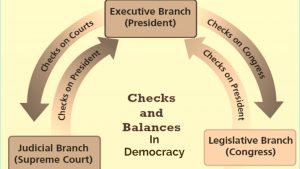
Checks and balances is a political theory and a very essential pillar of government. This theory posits that there should be a mutual oversight and limitation by the arms of government in order to prevent abuse of power.
I have already explained how separation of powers helps to foster democracy and fight against dictatorship in government. Now, the theory of checks of balances further helps to achieve that by allowing the arms of government to check the activities of each other.
Another reason for the theory of checks and balances is to curb excesses of power by one arm of the government. Thus, the judiciary can check the activities of the legislature or executive to see whether they are both acting under their assigned constitutional powers. In turn, the legislature can check the activities of others and the executive can also do the same.
Also read: Differences between offer and invitation to treat in contract law
6. Rule of law

Rule of law simply means supremacy of the law. It posits that the law is above everybody in a political system and thus, no arm of government, agency or organization is supreme.
The theory of rule of law was propounded by A.V Dicey. It is one of the greatest features and tenets of democracy because the dreams and aspirants of the people are contained in the law. This therefore makes the law Supreme even above the government itself.
It should be noted however that there are many factors that can actually limit the rule of law in a nation. Some of them includes: immunity of leaders, etc.
7. Fundamental human rights

The last important pillar of democracy is fundamental human rights. These rights are free given rights which are inalienable and immutable. Fundamental human rights are seen as one of the pillars of democracy because they protect the interest of citizens. Take for instance, the Universal declaration of human right ensures that member countries provide for the fundamental human rights of their citizens by entrenching it in the constitution. These rights includes the right to life, right to freedom of speech, right to freedom of expression, freedom of movement etc. Where these rights are not provided for in the constitution, then there is no true democracy because the interest of the people are not well protected.
Recommended: Most Powerful African Countries
8. Accountability and Transparency: A successful democracy is built on the fundamental foundations of transparency and accountability. Transparency assures that public and media access, as well as public knowledge of government acts, decisions, and procedures. It indicates that people have a right to know what their government is up to and how it is utilising the commons.

On the other hand, accountability refers to holding individuals in authority accountable for their deeds and choices. It includes procedures for holding those responsible for wrongdoing, corruption, or abuse of authority accountable. A few examples of accountability procedures are audits, inquiries, and legal action.
Transparency and accountability go hand in hand in a democratic society to thwart corruption, preserve public confidence, and guarantee that elected officials and public workers behave in the best interests of the people.
9. Civil Society and NGOs (Non-Governmental Organizations): A strong democracy needs both an active civil society and the presence of NGOs. The term “civil society” refers to a broad spectrum of nonprofit organisations, activist groups, and associations established by private persons.

Particularly in tackling diverse social, political, and environmental challenges, NGOs are extremely important.
These groups give people a forum on which to express their worries, fight for their rights, and hold the government responsible. They frequently operate as a conduit between citizens and decision-makers, bridging the gap between societal demands and governmental responses.
NGOs and civil society organisations can carry out tasks including research, awareness-building, protest planning, and social service delivery. They support civic involvement, monitor human rights, and participate in policy deliberations. By doing this, they contribute to ensuring that individuals have access to means of participating in democracy and influencing governmental choices.
Also read: Differences between Cross-offers and counter-offers
So far we have looked at the meaning of democracy, types of democracy, reasons for democracy and the pillars of democracy. Obviously this article has done justice in explaining the major pillars of democracy and how the help to safeguard and maintain the features of democracy in a nation. However, if you have questions or comments on this work, kindly leave it at the comment section below.

Edeh Samuel Chukwuemeka, ACMC, is a lawyer and a certified mediator/conciliator in Nigeria. He is also a developer with knowledge in various programming languages. Samuel is determined to leverage his skills in technology, SEO, and legal practice to revolutionize the legal profession worldwide by creating web and mobile applications that simplify legal research. Sam is also passionate about educating and providing valuable information to people.
wonderful article,the word i will use in describing your article is brilliant, wonderful, stupendous,
Thank you for reading Barrister Bode Thomas.
I am so blessed by this article.with this i have been able to know the 7 pillars of democracy.God bless you
a wonderful article was simple and beautifully to the point. You basically just save my research paper
Hello there, I discovered your website by means of Google at the same time as searching for a related subject, your web site came up, it seems to be good. I have bookmarked it in my google bookmarks.
What a nice article, a great bus stop. i have really suffered tring to get pillars of democracy. it’s very good and accurate , keep it up.
Thank you very much EBERECHI NWANGUMA. God bless!
I have to share this with my friends it’s lovely
Interesting
It is so wonderful to recover all pillars of democracy today’s. Thank u so much Mr writer.
I will share this with my friend you guys are incredible